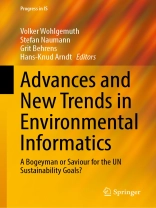This book is an outcome of the 35th International Conference Enviro Info 2021, held at Humboldt University Berlin, organized by the technical committee for Environmental Informatics of the German Informatics Society. It presents a selection of papers that describe innovative scientific approaches and ongoing research in environmental informatics and the emerging field of environmental sustainability, promoted and facilitated by the use of information and communication technologies (ICT). The respective articles cover a broad range of scientific aspects including advances in core environmental informatics-related technologies such as earth observation, environmental modelling, big data and machine learning, robotics, smart agriculture and food solutions, renewable energy-based solutions, optimization of infrastructures, sustainable industrial processes and citizen science, as well as applications of ICT solutions intended to support societal transformation processes toward the more sustainable management of resource use, transportation and energy supplies. A special focus lies on the question how environmental informatics can contribute to achieving the United Nations Sustainable Development Goals. Given its scope, the book is essential reading for scientists, experts and students in these fields of research.
表中的内容
An Approach to Describe Design Pattern Structures for Sustainable Software Products.- A Taxonomy about Information Systems Complexity and Sustainability.- Microservice-based Architecture for the Integration of Data Backends and Dashboard Applications in the Energy and Environment Domains.- A Literature Review to analyze the State of the Art of Virtual Power Plants in Context of Information Security.- Rebound Effects in Methods of Artificial Intelligence.- Assisting PV experts in on-site condition evaluation of PV modules using weather-independent dark IV string curves, artificial intelligence and a web-database.- Resource and Energy Efficiency Analysis in Bottle-to-Bottle Recycling Plant – Case Study.- Air pollution due to central heating of a city-centered university campus.- Epi Desktop – A Spatial Decision Support System for Simulating Epidemic Spread and Human Mobility Trends Under Different Scenarios.- Human Behavior Model in Public Pedestrian-only Space Estimated using High-precision Trajectory Data.- Assessment of the large city population vulnerability to natural and man-made hazards using mobile operators data (case study of Moscow, Russia).- CITADINE: A platform to provide the experiences of survivors of natural disasters as open educational resources for risk communication.- Evaluation of a sustainable last-mile crowdshipping concept based on electric cargo bikes.- Mobility as a Service and the Avoid-Shift-Improve approach.- Towards a conceptual framework to assess the GHG impacts of ICT applications in passenger transport.- Shared Goods and Impacts on Consumption; The Case of the Digital Sharing Economy.- A review on Key Performance Indicators for Climate Change
关于作者
Volker Wohlgemuth is a full professor for Industrial Environmental Informatics at the School of Engineering—Technology and Life, University of Applied Sciences, HTW Berlin (Germany). His research fields are material flow management, modelling and simulation, industrial symbiosis and environmental management information systems.
Stefan Naumann is a full professor for Computer Science, Mathematics and Environmental/ Sustainability Informatics at the Trier University of Applied Sciences (Germany). His research interests are the environmental impacts of IT, especially of software, and environmental informatics in general.
Grit Behrens is a full professor for Applied Computer Science at the University of Applied Sciences, FH Bielefeld (Germany). Her research fields are applications in machine learning in the fields of photovoltaic solutions and generally in environmental informatics.
Hans-Knud Arndt is a full professor of Business Informatics–Management Information Systems at the Otto-von-Guericke-University Magdeburg (Germany). His environmental informatics research focuses on meta data, sustainable reporting, sustainable design of information systems and sustainable usability/user experience.












